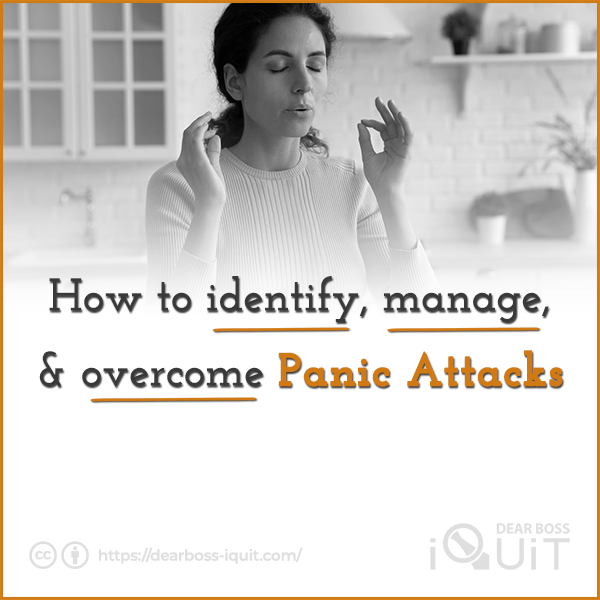Panic attacks can take over your life at any moment. These episodes come on quite suddenly and bring about intense feelings of fear, anxiety, or dread. Experiencing panic attacks can be overwhelming or confusing, possibly making you feel isolated or that there is something wrong with you.
However, panic attacks are more common in work-related settings than you might think, especially in cases where employees are overworked or hate their jobs. In fact, according to the Cleveland Clinic, up to 11% of Americans experience panic attacks each year, with 2-3% of Americans developing panic disorder.
Therefore, if you frequently experience panic attacks, rest assured that you are not alone. Let’s delve deeper into what a panic attack is, how your work environment may contribute to them, and how you can manage and prevent these episodes.
Signs of Panic Attacks
Panic attacks are sudden episodes of fear or anxiety that result in physical symptoms.
In addition to the overwhelming sense of dread, panic attacks temporarily take over the entire body. This can make it impossible to focus on the present moment, connect with others, or finish current work or tasks.
If you are unsure whether you are experiencing panic attacks, here is a list of common physical symptoms associated with these episodes:
- Sweating
- Racing heart
- Difficulty breathing
- Tingling or numbness
- Nausea
- Chills
- Chest pain
- Trembling or shaking
- Headache
- Dizziness
- Hot flashes
Sometimes, panic attacks are not just occasional momentary episodes. Some people experience frequent panic attacks that may turn into panic disorder. Those who experience multiple episodes may have their whole lives consumed by panic and anxiety. These people report that their episodes cause:
- Insomnia
- Extreme irritability
- Agoraphobia
- Chronic anxiety
- Difficulty concentrating
As you can see, panic attacks and panic disorder are serious issues that can affect both your physical and mental health. If you believe you are dealing with panic attacks, you should seek treatment. Ignoring these episodes can be detrimental to your health.
However, it is critical to know that many other health conditions exhibit similar symptoms of panic attacks. If you are experiencing the symptoms mentioned above, then you should discuss them with a health care provider to see if there are any other potential causes.
How Your Work Environment Triggers Panic Attacks
Your work environment is probably one of the worst places to experience a panic attack. Having an episode in front of your coworkers can make you feel vulnerable, weak, or even embarrassed. However, it’s important not to beat yourself up for having a panic attack, as it is a normal reaction to being overworked or overstressed.
If you clicked on this article, then it’s possible you have experienced a panic attack (or severe panic or anxiety) at work. Rest assured that you are not alone. While genetics, substance abuse problems, and other mental health issues are typically considered the most significant causes of panic attacks and panic disorder, it seems that work is becoming an increasingly prominent factor.
According to the Anxiety and Depression Association of America, 72% of American employees deal with daily stress related to their work. Furthermore, more than half of American employees said that this stress affects their workplace performance, their relationship with colleagues, and the quality of their work.
There are quite a few work-related factors that can trigger frequent panic attacks. These include, but are not limited to:
- Demanding bosses
- Toxic work environment
- Large workload
- No work/life balance
- Competition among employees
- Lack of company ethics/values
- Lack of support/connection with coworkers
- Hating your job
As you can see, those who feel overworked and isolated at their jobs are more likely to have frequent panic attacks. Having too much work on your plate without having support or trusting other employees or management creates a toxic, stressful work environment. This environment can lead to constant anxiety and stress, which easily induce panic attacks and panic disorder.
How to Manage and Prevent Panic Attacks
Though panic attacks are terrifying to experience, the good news is that management and treatment options are available. Many people who seek treatment in some form report a significant decrease in their panic attacks and anxiety.
How to Manage Panic Attacks in the Moment
When a panic attack comes on, it can be a terrifying experience, and it is easy to feel like you’ve lost control. However, there are a few things you can do to regain control and get through the episode. Here are some tips to help you through a panic attack:
- Recognize and accept that you are having a panic attack
- Breath deeply
- Repeat a mantra
- Find your happy place or daydream about something positive
- Close your eyes to reduce stimuli
- Focus on a particular object until the episode passes
- Utilize mindfulness and focus on the present moment
How to Treat and Prevent Panic Attacks
The two most common forms of treatment are medication (either anti-depressants or anti-anxiety medication) and psychotherapy. Talking to a counselor can help you manage and prevent panic attacks. Together, you and your counselor can get to the root of your panic and develop a strategy to reduce future episodes.
However, you can also make a few lifestyle changes to prevent future panic attacks. These include:
- Decreasing caffeine consumption
- Getting more sleep
- Eating a healthy, balanced diet
- Taking more time to relax
- Meditate
- Exercise regularly
How to Change Your Workplace to Prevent Panic Attacks
If you know that your job is specifically causing your panic attacks, then you need to improve your work environment and work/life balance.
If you have an empathetic boss, try discussing limiting your workload or coming up with a more manageable schedule. On the other hand, if your work environment is causing panic, discuss the issues with your superiors or HR and see if there are any solutions to improve the workplace culture. Sometimes asserting boundaries and discussing the problems can bring about positive changes.
However, if these aren’t viable options, then it might be time to quit your job. Toxic work environments are a significant factor in one’s mental health, and sometimes the answer is to walk away. Don’t cling onto a job if it’s destroying your mental or physical health.
Conclusion
Sometimes it can feel like panic attacks are taking over your life. But they don’t have to. With a good management strategy, treatment, and some lifestyle changes, you can reduce and prevent panic attacks and regain control of your life.
If you’re interested in learning more about panic attacks and how they affect other areas of your life, head on over to BetterHelp for more information and advice.


